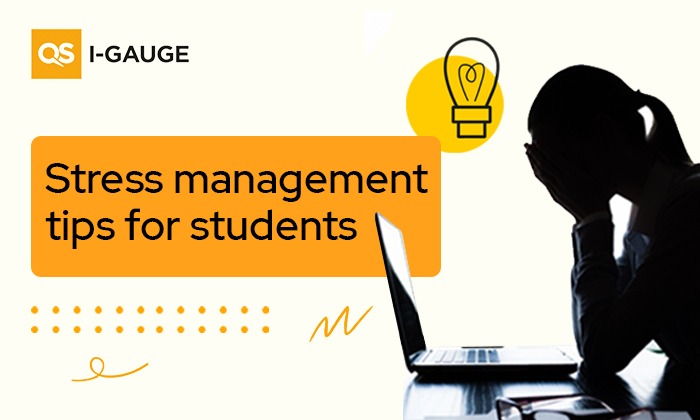
Stress is an ever-present factor in our daily lives, stemming from the regular challenges we face at work, school, or home. Whether meeting tight deadlines or handling personal conflicts, stress can manifest in different ways. Even minor disturbances can spark it, constantly reminding us that stress is an integral part of our everyday experiences.
So, what is Stress?
The *1National Institute of Mental Health states that - Stress is our mind and body’s natural response to external factors. Stress serves as the body's defence mechanism against perceived threats, often triggered by events or thoughts that lead to feelings of frustration, anger, or anxiety.
For example, as a student, you could be stressed about:
- Academic stress from exams, assignments, and grades
- Fear of failure
- Heavy workload and tight deadlines
- Adapting to college life or a new school
- Uncertainty about the future, such as career decisions or college admissions
- Juggling school/college with extracurricular activities or part-time jobs
- Disagreements with friends and more.
Experiencing stress in specific situations is an instinctive reaction as our body and mind have to deal with challenges. Stress can serve as a motivator to meet deadlines or handle tough situations, signalling the need to address issues. Nonetheless, prolonged stress is detrimental. Continuous stress can result in burnout and impact overall health and wellness. Managing stress effectively and striving for balance is crucial.
Here are some tips for students to effectively manage stress and incorporate mindfulness:
1. Prioritise your activities - Create a priority task list in the order of the ones that most demand your attention, time, and dedication. By tackling these tasks first, you can avoid last-minute stress. Plan your day wisely to allocate sufficient time for each task. Effective time management is essential for balancing academic responsibilities and extracurricular commitments.
2. Get good sleep - Insufficient sleep affects cognitive function and emotional control, making it challenging to manage everyday stress. This can result in heightened irritability, anxiety, and reduced concentration, worsening stress levels. Long-term sleep deprivation can establish a cycle of increased stress and more sleep disturbances, impacting overall well-being. As students, you will need about 7-8 hours of quality sleep every day. Get enough sleep to manage your day better.
3. Balance both your body and mind - Both physical and mental well-being hold equal importance for students.
Physical activity plays a vital role in helping students effectively manage and alleviate stress. Regular exercise, such as jogging, sports, or brisk walking, triggers the release of endorphins, natural mood enhancers. These chemicals counteract stress hormones, leading to an enhanced mood. Moreover, exercise enhances sleep quality, increases energy levels, and improves focus and concentration.
Meditation is not just for grown-ups! – With stress levels mounting for all age groups, incorporating meditation and mindfulness into daily routine is crucial for everyone. Dedicate a few minutes each day to concentrate on breathing and calm your thoughts. Start with guided meditations or use mindfulness apps to establish a regular practice. Consistent meditation aids in stress management, encouraging relaxation, enhancing focus, and nurturing emotional strength, leading to well-being and academic achievements.
Focus on your eating patterns - Stress can lead students to overeat as a means to manage negative emotions. The body's response to stress can intensify cravings for calorie-dense comfort foods, encouraging emotional eating. While this behavior may offer momentary relief, it can establish unhealthy patterns, leading to weight gain and additional stress over time. It is hence important to incorporate nutritious foods into the diet along with mindful eating patterns. *2
4. Establishing and sustaining supportive relationships to alleviate stress
-Cultivating positive relationships with friends, family, and peers can effectively lower stress levels for students.
- Supportive social bonds offer emotional support and practical assistance, making difficulties easier to handle.
- Positive exchanges cultivate a sense of belonging and reduce feelings of isolation.
- Engaging in healthy communication and sharing experiences can ease tension and provide fresh insights.
- Ultimately, nurturing these connections builds a supportive network that increases resilience, enhances confidence, and encourages a healthier, more balanced approach to managing stress.
5. Engage in creative activities and relaxation techniques
- Explore creative hobbies like painting, singing/listening to music, drawing, journaling, crafting, learning musical instruments, cooking, baking, gardening, and more.
- Socialise with individuals who bring laughter and help lower stress levels.
- If you love animals, spend time playing with pets.
- Utilise virtual reality technology to discover soothing environments.
- Immerse yourself in nature or tranquil settings to escape and reduce stress.
6. Consult a Professional if Required - If stress becomes overwhelming, seeking help from a mental health professional can provide valuable support and coping strategies. Many educational institutions offer counselling services that can assist students in managing their stress effectively.
Conclusion
Effective stress management is essential for student well-being. Keep in mind, the aim is not to eradicate stress completely, but rather to develop constructive coping mechanisms for it. Embracing these strategies fosters a balanced, healthier approach to managing stress and enhancing overall success.
Disclaimer
The blog is curated by referring to various credible sources and does not necessarily reflect the opinions or positions of QS I-GAUGE. The information provided is for general informational purposes only, readers are advised to conduct their own research and seek professional advice before making any decisions.
References
*1https://www.nimh.nih.gov/health/publications/so-stressed-out-fact-sheet
*2https://www.health.harvard.edu/healthbeat/how-stress-can-make-us-overeat
Read more
https://amberstudent.com/blog/post/tips-for-stress-management-for-students
https://www.mindful.org/how-to-manage-stress-with-mindfulness-and-meditation/
https://www.weljii.com/blog/top-7-stress-management-tips-for-students/
https://timelycare.com/blog/stress-management-tips-for-college-students




